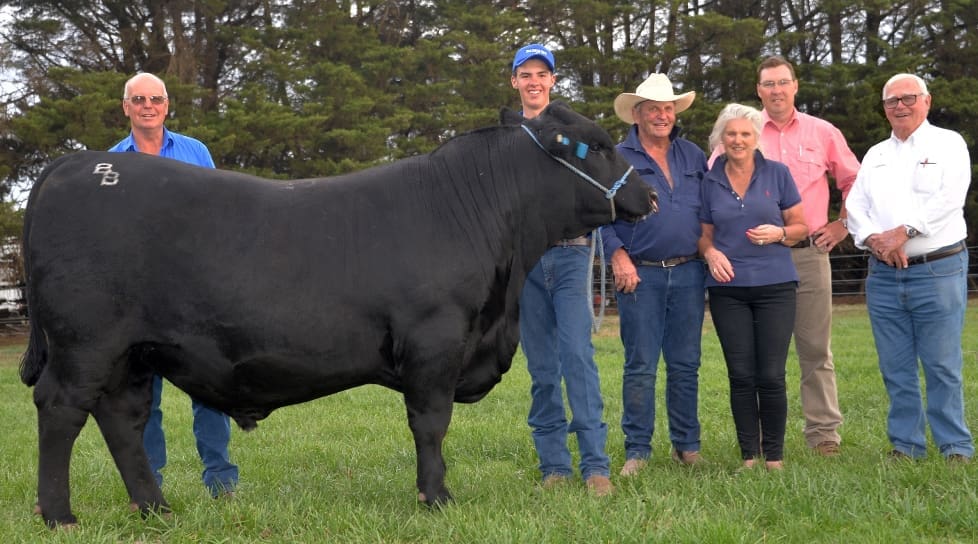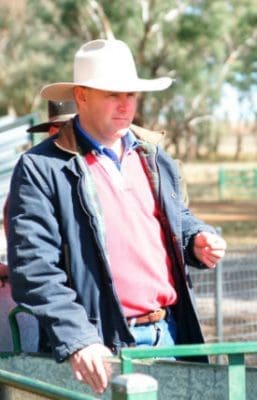
Last week’s Banquet Angus sale at Mortlake saw a 100pc clearance of 96 bulls, averaging $9625 – some $400 better than last year. Pictured with the $48,000 top priced bull Banquet National N278, were Banquet’s Stephen and Hamish Branson, buyers Charles and Cass Kimpton, Toora West, Glenthompson, and auctioneers Ross Milne (Elders) and Kevin Norris (Landmark).
THE autumn round of bull sales has been underway for several weeks across southern Australia and Queensland. While the bulk of the sales will occur in southern Australia during March, there have been some interesting trends to emerge from the sales held so far.
I have been talking to a number of seedstock breeders and agents in recent days, who have provided some insights into the results of sales to date.
In general, despite several sales with lower than expected clearances, there is a feeling of confidence in both southern and northern Australia.
Independent auctioneer Michael Glasser of GTSM said while clearances were down, averages remained solid across the southern sales held so far.
In general, sales have been impacted by the reduced number of cows in southern breeding herds, particularly in southern NSW and Victoria, and a growing awareness that water is rapidly becoming the most limiting resource for many cattle businesses.
Michael Glasser’s description was that “water and cows” would drive clearances for a number of bull sales reliant on local support.
These are comments echoed in conversation with Raven Limousin & LimFlex stud principal, Jason Schulz. The recently-held Raven sale in South Australia resulted in a lower than expected clearance of 56 percent. However this was very much in line with clearances from several other SA sales held recently, with strong focus on local and regional producers.
While water is not as limiting for the Raven operation, Jason Schulz described the transition many producers are making to reduce cow numbers to manage drought conditions.
This probably impacts more on breeders of European breeds where traditionally the older portion of cows was joined to a European bull as a terminal cross. These cows have been removed from the program of many producers and the subsequent demand for bulls has fallen.
Attitudes to bull selection
Although disappointed by clearance numbers, Jason was also positive in describing producers’ attitudes to bull selection. Bulls with solid high accuracy performance data were highly sought-after, and in many cases lifted sale averages.
It appears that producers are using the opportunity to purchase better genetics, even though the volume of bulls they require may be lower than in years past.
It is a trend Jason feels will continue, as producers seek to rebuild post-drought. His comment that “when it rains it wont rain cows” is fairly apt as most herds will face several years of building numbers back to levels pre 2018-19.
As result demand for bulls will be lower, but expectations of genetics will be increasingly higher.
Strong result in Queensland
Given recent events in Queensland with catastrophic flooding and a seventh year of drought in some areas, it can be hard to appreciate there would be a solid and increased demand for bulls. However the recent Big Country Brahman Sale in Charters Towers is a definite sign of a positive and confident northern industry.
The sale was conducted over two days and resulted in a 100pc clearance of 307 bulls, to an average of $8655.
Marketing agent Ken McCaffrey described the sale as one that was full of “confidence and positivity.” While most of the bulls went to areas in the Northern Goldfields and Charters Towers, big lines were sourced to head to the Northern Territory, North West Queensland and Darling Downs.
As an early flagship sale for the Queensland bull breeding sector, the confidence in bull purchases reflects the general optimism regarding the industry.
The strength of the live export market (boat cattle for Indonesia ex Darwin quoted at 335c/kg this week) has offered many producers in northern Queensland and the Northern Territory viable market options beyond the slaughter markets. In fact the challenge fro traditional bullock finishers is accessing suitable steers to grow out to the heavier weights as many lighter steers are heading into the live trade in recent times.
This optimism has underpinned the north’s autumn sales like Gold City this year, however the strength of the sale lies again in a focused approach by producers seeking particular genetics and for the consistency that is on offer to suit their breeding herd.
I think in many ways the results to date in 2019 reflect the predictions made by bull breeders at the start of the year. Producers are definitely prepared to invest in good genetics, and this is clear from the strong prices and solid averages across the country.
Cow numbers and access to water as drought conditions continue, will most likely see reduced demand at sales, however.
Approach sales with clear goals
My advice to producers is to ensure they approach upcoming sales with clear goals in mind for the bulls they want to purchase.
It’s clear that there will be strong competition for bulls that have the potential to lift herd productivity. It will be important not to assume that lower clearances will mean less demand for those bulls. It is more likely these bulls will sell for prices above the average, particularly as buyers become more discerning in their purchases.
Possibly the other key trend for many producers to consider is the opportunity to upgrade their sire battery in a more cost-effective manner.
Salvage values for older bulls at the meatworks remain reasonably high, and the change-over to a genetically superior bull on current figures is much more attractive than it has been in recent years.
It may be that for many, the window of opportunity for a cheaper upgrade will only exist in 2019. Depending on clearances in coming weeks, many breeders may reconsider their sale numbers in 2020 and any restriction in supply of bulls may see prices, particularly for the genetically superior sires, continue to increase.

Alastair Rayner is the Principal of RaynerAg, an agricultural advisory service based in NSW. He regularly attends bull sales to support client purchases and undertakes pre sale selections and classifications. He can be contacted here or through his website www.raynerag.com.au



HAVE YOUR SAY